|
|
|
Sort Order |
|
|
|
Items / Page
|
|
|
|
|
|
|
| Srl | Item |
| 1 |
ID:
139503
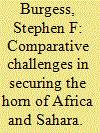

|
|
|
|
|
| Summary/Abstract |
Geography helps to explain why violent extremist organizations are difficult to counter; vast ungoverned spaces combined with weak states make it nearly impossible to decisively defeat them. However, partial success has been achieved by the United States in the Horn of Africa with a strategy of training, equipping, and supporting African intervention forces and attacking extremist leaders. In contrast, a strategy of containment in the Sahara, focusing on counterterrorism training for regional security forces and countering extremist ideology, did not succeed in preventing militant groups from taking over northern Mali and expanding their activities to other parts of the region.
|
|
|
|
|
|
|
|
|
|
|
|
|
|
|
|
| 2 |
ID:
139499
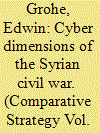

|
|
|
|
|
| Summary/Abstract |
The use of cyber operations, as well as the interaction of other elements of power that have an effect on cyber operations, represents another method by which nations and non-state actors may attempt to achieve political ends. The Syrian civil war has encompassed many elements of warfare, including cyber operations. A study of the observed cyber operations by both direct and indirect participants in the Syrian civil war can lead to valuable lessons regarding who operates in the cyber domain, what these operators can accomplish, and how a nation-state can respond. These lessons may be applied to future conflicts.
|
|
|
|
|
|
|
|
|
|
|
|
|
|
|
|
| 3 |
ID:
139504
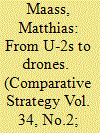

|
|
|
|
|
| Summary/Abstract |
Since September 11, 2001, the United States has been relying heavily on drone strikes for counterterrorism. This policy remains controversial. I argue that assertive statecraft is needed to prevent drone strikes from undermining U.S. foreign and security policy over the long term. The article argues legally, comparatively, and historically, using President's Eisenhower restrictions on U.S. aerial espionage programs during the earlier Cold War, as a benchmark for President Obama's policy on missions by armed drones. A more limited drone program offers a better balance between what is necessary for security and what is politically sustainable.
|
|
|
|
|
|
|
|
|
|
|
|
|
|
|
|
| 4 |
ID:
139498
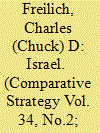

|
|
|
|
|
| Summary/Abstract |
The article is a first attempt to systematically assess the impact of leaks on Israeli decision-making. Five major cases were studied on three levels: whether leaks affected the process, policies adopted, and outcomes. Leaks had a strong impact in two cases, but not on the policies adopted, or outcomes, in any of the cases analyzed. As a tentative conclusion, most leaks are about Israel's broad strategic thinking and the politics thereof, rather than hard information. The primary impact is on process, important in itself, not substance.
|
|
|
|
|
|
|
|
|
|
|
|
|
|
|
|
| 5 |
ID:
139500
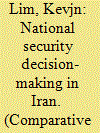

|
|
|
|
|
| Summary/Abstract |
This article reviews national security decision-making in the Iranian context by focusing on institutions, formal process and individuals. It specifically examines the Supreme National Security Council, which formalizes and embodies the decision-making process, as well as the Revolutionary Guards, which epitomize both the influence of institutions as well as the centrality of the agent-individual. Despite the plurality of formal institutions and the existence of process, decision-making remains heavily centered on a small group of largely unelected individuals driven as much by ‘regime expediency’ as by mutual give-and-take along informal, microfactional lines. While he may have the last word, even Iran's current Supreme Leader is constrained by these ideological, negotiational and structural factors. These key figures are closely affiliated either with the politico-clerical founding kernel of the 1979 Revolution, or the powerful Revolutionary Guards—mainly the hardliners in any case—and are instrumental in determining the discursive boundaries of national security, the scope of which this article confines to defense and foreign policy. Finally, how all this coheres in the realm of strategy has as much to do with regime survival as with the art of reconciling ends and means.
|
|
|
|
|
|
|
|
|
|
|
|
|
|
|
|
| 6 |
ID:
139501
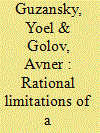

|
|
|
|
|
| Summary/Abstract |
The question of how to measure a state's rationality and compatibility with deterrence must be confronted in order to address the broader theoretical discussion concerning the credibility and effectiveness of deterrence. This article broadens Janice Stein's three-condition model of potential constraints of deterrence as a theory and a strategy. It then applies this revised model as a means of identifying potential obstacles to a future nonconventional deterrence regime with Iran, concluding with an assessment as to whether this analysis can support the argument that such a future deterrence regime would be stable.
|
|
|
|
|
|
|
|
|
|
|
|
|
|
|
|
| 7 |
ID:
139502
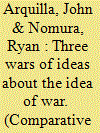

|
|
|
|
|
| Summary/Abstract |
Strategic debates have long characterized the discourse on military affairs. Three lively disputes concern: 1) Whether set “principles of war” can be codified and mastered; 2) The relative strengths and limitations of maritime and continental power; and 3) The potential for waging successful “short wars.” Carl von Clausewitz provided the sharpest critique of the principles of war, arguing that “friction” can overwhelm even highly refined military art. A.T. Mahan's concept of sea power was challenged by Halford Mackinder's theory of “heartland power.” Short-war notions animated by Moltke the Elder's victories in the 19th Century German wars of unification, and expanded upon by his successors, were rebutted by Ivan Bloch. Each debate remains relevant: technological advances prompt reappraisal of principles of war; the rise of China and the resurgence of Russia as great continental powers challenge American naval mastery; and insurgents and terrorists continue to prove the value of “long wars.”
|
|
|
|
|
|
|
|
|
|
|
|
|
|
|
|
|
|
|
|
|